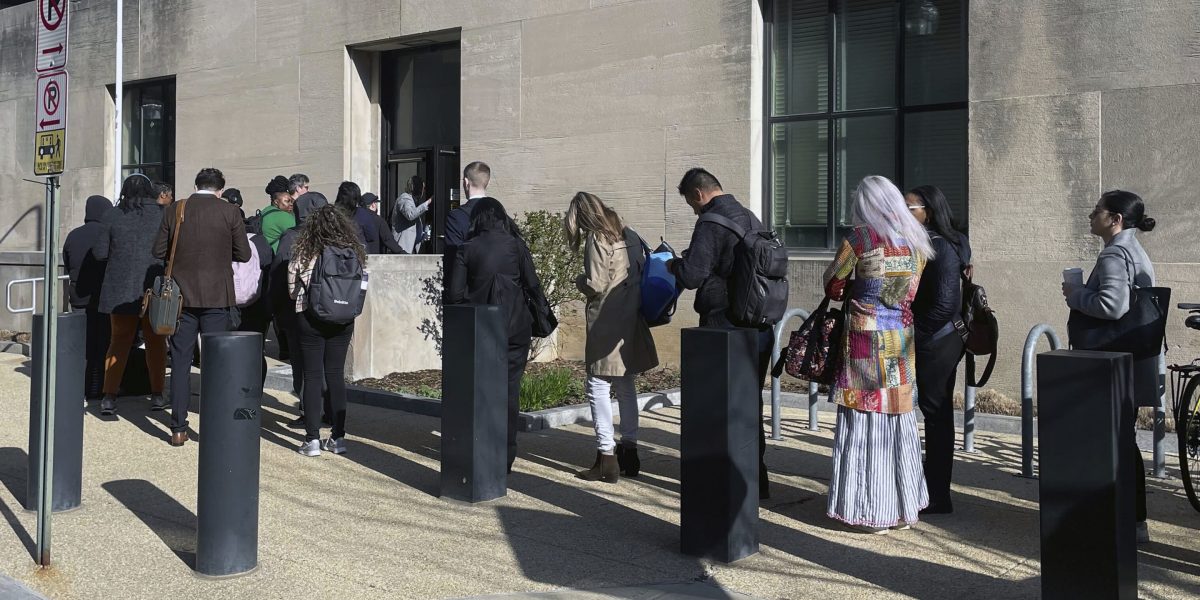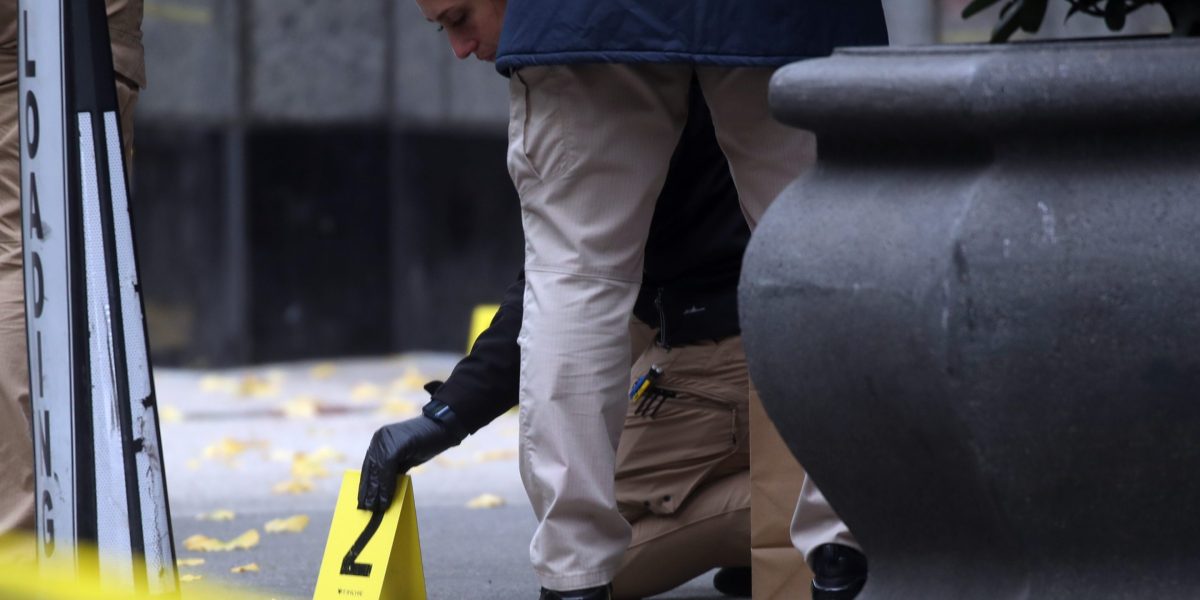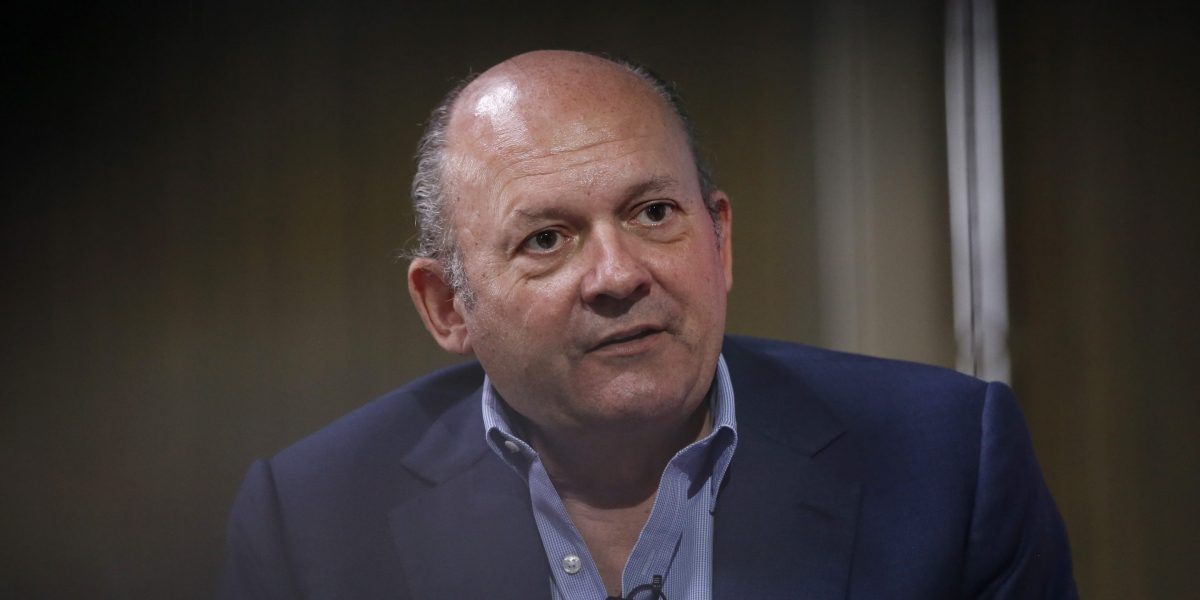- As many as 10,000 workers are expected to lose their jobs Tuesday and some are finding out as they try to enter the building that they no longer have jobs. Laid off staffers are being asked to immediately turn in their badges and cellphones at the door. One staffer waiting in line loudly joked: “Is this an April Fool’s joke?”
Employees across the massive U.S. Health and Human Services Department began receiving notices of dismissal on Tuesday in an overhaul ultimately expected to lay off up to 10,000 people. The notices come just days after President Donald Trump moved to strip workers of their collective bargaining rights at HHS and other agencies throughout the government.
At the National Institutes of Health, the world’s leading health and medical agency, the layoffs occurred as its new director, Dr. Jay Bhattacharya, began his first day of work.
Health Secretary Robert F. Kennedy Jr. announced a plan last week to remake the department, which, through its agencies, is responsible for tracking health trends and disease outbreaks, conducting and funding medical research, and monitoring the safety of food and medicine, as well as for administering health insurance programs for nearly half of the country.
The plan would consolidate agencies that oversee billions of dollars for addiction services and community health centers under a new office called the Administration for a Healthy America.
The layoffs are expected to shrink HHS to 62,000 positions, lopping off nearly a quarter of its staff — 10,000 jobs through layoffs and another 10,000 workers who took early retirement and voluntary separation offers.
At the NIH, the cuts included at least four directors of the NIH’s 27 institutes and centers who were put on administrative leave, and nearly entire communications staffs were terminated, according to an agency senior leader, speaking on condition of anonymity to avoid retribution.
An email viewed by The Associated Press shows some senior-level employees of the Bethesda, Maryland, campus who were placed on leave were offered a possible transfer to the Indian Health Service in locations including Alaska and given until end of Wednesday to respond.
Democratic Sen. Patty Murray of Washington predicted the cuts will have ramifications when natural disasters strike or infectious diseases, like the ongoing measles outbreak, spread.
“They may as well be renaming it the Department of Disease because their plan is putting lives in serious jeopardy,” Murray said Friday.
Beyond layoffs at federal health agencies, cuts are beginning to happen at state and local health departments as a result of an HHS move last week to pull back more than $11 billion in COVID-19-related money. Local and state health officials are still assessing the impact, but some health departments have already identified hundreds of jobs that stand to be eliminated because of lost money, “some of them overnight, some of them are already gone,” said Lori Tremmel Freeman, chief executive of the National Association of County and City Health Officials.
Union representatives for HHS employees received a notice Thursday that 8,000 to 10,000 employees will be terminated. The department’s leadership will target positions in human resources, procurement, finance and information technology. Positions in “high cost regions” or that have been deemed “redundant” will be the focus of the layoffs.
Kennedy criticized the department he oversees as an inefficient “sprawling bureaucracy” in a video Thursday announcing the restructuring. He said the department’s $1.7 trillion yearly budget, “has failed to improve the health of Americans.”
“I want to promise you now that we’re going to do more with less,” Kennedy said.
The department on Thursday provided a breakdown of some of the cuts.
__ 3,500 jobs at the Food and Drug Administration, which inspects and sets safety standards for medications, medical devices and foods.
__ 2,400 jobs at the Centers for Disease Control and Prevention, which monitors for infectious disease outbreaks and works with public health agencies nationwide.
__ 1,200 jobs at the NIH.
__ 300 jobs at the Centers for Medicare and Medicaid Services, which oversees the Affordable Care Act marketplace, Medicare and Medicaid.
At the CDC, most employees have not been unionized, but interest rose sharply this year as the Trump administration took steps to reduce the federal workforce. Roughly 2,000 CDC employees in Atlanta belonged to the American Federation of Government Employees local bargaining unit, with hundreds more who had petitioned to join in recent days being added.
But on Thursday night, Trump signed an executive order that would end collective bargaining for a large number of federal agencies, including the CDC and other health agencies.
The erosion of collective bargaining rights was decried by some Democratic lawmakers.
“President Trump’s brazen attempt to strip the majority of federal employees of their union rights robs these workers of their hard-fought protections,” Reps. Gerald Connolly and Bobby Scott, both of Virginia, said in a joint statement Friday.
“This will only give Elon Musk more power to dismantle the people’s government with as little resistance from dedicated civil servants as possible — further weakening the federal government’s ability to serve the American people.”
This story was originally featured on Fortune.com
Source link


 Entertainment8 years ago
Entertainment8 years ago
 Politics8 years ago
Politics8 years ago
 Entertainment8 years ago
Entertainment8 years ago
 Entertainment8 years ago
Entertainment8 years ago
 Tech8 years ago
Tech8 years ago
 Tech8 years ago
Tech8 years ago
 Tech8 years ago
Tech8 years ago
 Politics8 years ago
Politics8 years ago






